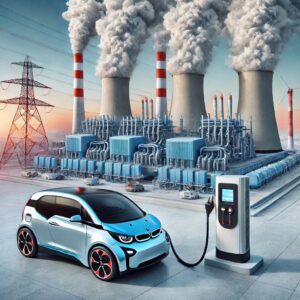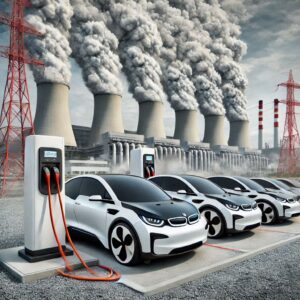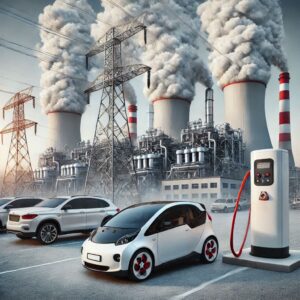電気自動車=エコ?とは?
電気自動車(EV)は、ガソリンやディーゼルなどの化石燃料を使用せず、電気をエネルギー源として走行する車です。
排気ガスを直接排出しないため、従来の内燃機関車(ICE: Internal Combustion Engine)と比較して「エコ(環境に優しい)」と言われています。
しかし、結局は電気を発電していることで環境負荷が大きくなっているという話もあります。
ここではそんな電気自動車がエコであるかについて説いている風刺画をAIで描いてみました。
EVが「エコ」とされる理由
走行時のゼロエミッション
ガソリン車やディーゼル車とは異なり、EVは走行中に二酸化炭素(CO₂)や有害物質(窒素酸化物やPM2.5)を排出しません。
都市部の空気質改善や地球温暖化対策に貢献。
再生可能エネルギーとの相性
電気エネルギーが再生可能エネルギー(太陽光、風力、水力など)から供給される場合、全体の二酸化炭素排出量を大幅に削減可能。
エネルギー効率の高さ
内燃機関車のエネルギー効率は約20〜30%程度ですが、EVは約80〜90%と効率が高い。
EVが本当にエコであるか議論されるポイント
電力の発電方法
電気が化石燃料由来(石炭、天然ガスなど)**の発電所で生産されている場合、CO₂排出量はゼロではありません。
発電効率や発電所の種類によっては、ガソリン車と同等、あるいはそれ以上のCO₂を間接的に排出する可能性も。
再生可能エネルギーが普及している国や地域では、EVの環境負荷は低くなる。
バッテリー製造の環境負荷
リチウムイオン電池の製造過程で多くのエネルギーを消費し、CO₂が排出される。
リチウム、コバルト、ニッケルなどの採掘に伴う環境破壊。
採掘地では人権問題(児童労働など)も懸念される。
使用後の廃棄・リサイクル
EVの使用済みバッテリーの処理が課題。
適切にリサイクルされないと、有害物質が環境に漏出するリスクがある。
走行距離による効果の差
EVの製造時のCO₂排出量はガソリン車よりも高い。
長期間・長距離走行することで、運用中の低CO₂排出が製造時の負荷を相殺する。
例えば、約5万~10万キロメートル以上走行することで、トータルでの環境負荷がガソリン車よりも低くなるという試算がある。
ガソリン車との比較
| 項目 | ガソリン車 | 電気自動車(EV) |
| 走行時の排出ガス | CO₂や有害物質を排出 | 排出なし(ゼロエミッション) |
| 製造時のCO₂排出量 | 少ない | 多い(バッテリーが原因) |
| エネルギー効率 | 約20〜30% | 約80〜90% |
| 電源の依存性 | 化石燃料 | 電力(発電方法に依存) |
| ライフサイクル全体のCO₂排出 | 高い(長期的に) | 低い(再生可能エネルギーが鍵) |
未来の課題と可能性
再生可能エネルギーの拡大
EVの真価は、電力がどのように生産されるかに大きく依存。
再生可能エネルギーが普及すれば、製造・運用・廃棄の全過程で環境負荷が低減される。
バッテリー技術の革新
環境負荷を減らす新しいバッテリー素材の開発。
例:固体電池(リチウムを使わないバッテリー)。
効率的なリサイクル技術の確立。
社会的インフラの整備
EV充電ステーションの増設。
EVを再生可能エネルギーで充電できるシステムの導入。
EVが本当に「エコ」になるために必要なこと
「総合的な視点が必要」:EVがエコかどうかは「製造」「運用」「廃棄」すべての段階での環境負荷を評価する必要がある。
「人の選択も重要」:EV購入後の走行距離を伸ばし、再生可能エネルギーを活用して充電することで、エコな使用が可能に。
電気自動車(EV)は、走行中のゼロエミッションやエネルギー効率の高さから、「エコ」と言える部分が確かに存在します。しかし、電力供給の状況やバッテリー製造の環境負荷を考慮すると、必ずしも「完全にエコ」とは言い切れません。今後、再生可能エネルギーの普及やバッテリー技術の革新が進めば、EVはより環境に優しい選択肢として確立されるでしょう。
Electric vehicles (EVs) do not use fossil fuels such as gasoline or diesel, but instead run on electricity as their energy source.
Since they do not directly emit exhaust gas, they are said to be “eco-friendly” compared to conventional internal combustion engine vehicles (ICE: Internal Combustion Engine).
However, there is also a story that the environmental burden is ultimately increased by the fact that electricity is being generated.
Here is an AI drawing of a caricature that explains how electric vehicles are eco-friendly.Reasons why EVs are considered “eco-friendly
Zero emissions when driving
Unlike gasoline and diesel vehicles, EVs do not emit carbon dioxide (CO₂) or harmful substances (nitrogen oxides and PM2.5) while driving.
Contributes to improving air quality in urban areas and combating global warming.Compatibility with renewable energy
When electrical energy is supplied from renewable energy sources (solar, wind, hydro, etc.), overall CO2 emissions can be significantly reduced.High energy efficiency
The energy efficiency of internal combustion engine vehicles is about 20-30%, while EVs are about 80-90% efficient.Points to be debated whether EVs are truly eco-friendly
Method of electricity generation
When electricity is produced by fossil fuel-derived (coal, natural gas, etc.**) power plants, CO₂ emissions are not zero.
Depending on the efficiency of power generation and the type of power plant, CO₂ emissions may be equivalent or even higher than those of gasoline-powered cars indirectly.
In countries and regions where renewable energy is widespread, the environmental impact of EVs is lower.Environmental Impact of Battery Manufacturing
The manufacturing process of lithium-ion batteries consumes a lot of energy and emits CO₂.
Environmental destruction caused by mining of lithium, cobalt, nickel, etc.
Human rights issues (child labor, etc.) are also a concern in mining areas.Disposal and recycling after use
Disposal of used EV batteries is an issue.
If not properly recycled, there is a risk of toxic substances leaking into the environment.Difference in effects depending on driving distance
The CO₂ emissions of EVs during manufacturing are higher than those of gasoline-powered vehicles.
By driving longer and over longer distances, the lower CO₂ emissions during operation offset the load at the time of manufacture.
For example, there are estimates that the total environmental impact is lower than that of a gasoline vehicle after traveling approximately 50,000 to 100,000 kilometers or more.Expanding Renewable Energy
The true value of EVs depends largely on how electricity is produced.
The widespread use of renewable energy will reduce the environmental impact of the entire process of production, operation, and disposal.Battery Technology Innovation
Development of new battery materials that reduce environmental impact.
Example: solid-state batteries (lithium-free batteries).
Establishment of efficient recycling technologies.Development of social infrastructure
Expansion of EV charging stations.
Introduction of systems that can charge EVs with renewable energy.What is needed for EVs to become truly “eco-friendly
Comprehensive perspective is necessary”: To determine whether EVs are eco-friendly or not, it is necessary to evaluate the environmental impact at all stages of production, operation, and disposal.
People’s choice is also important”: Extending the driving range of EVs after purchase and recharging them using renewable energy sources will enable their eco-friendly use.Electric vehicles (EVs) can certainly be considered “eco-friendly” in part because of their zero emissions and energy efficiency while driving. However, they are not necessarily “completely eco-friendly” when considering the power supply situation and the environmental impact of battery manufacturing. In the future, as the spread of renewable energy and innovations in battery technology progress, EVs will be established as a more environmentally friendly option.
AIが描いた「電気自動車=エコ?」






















コメント